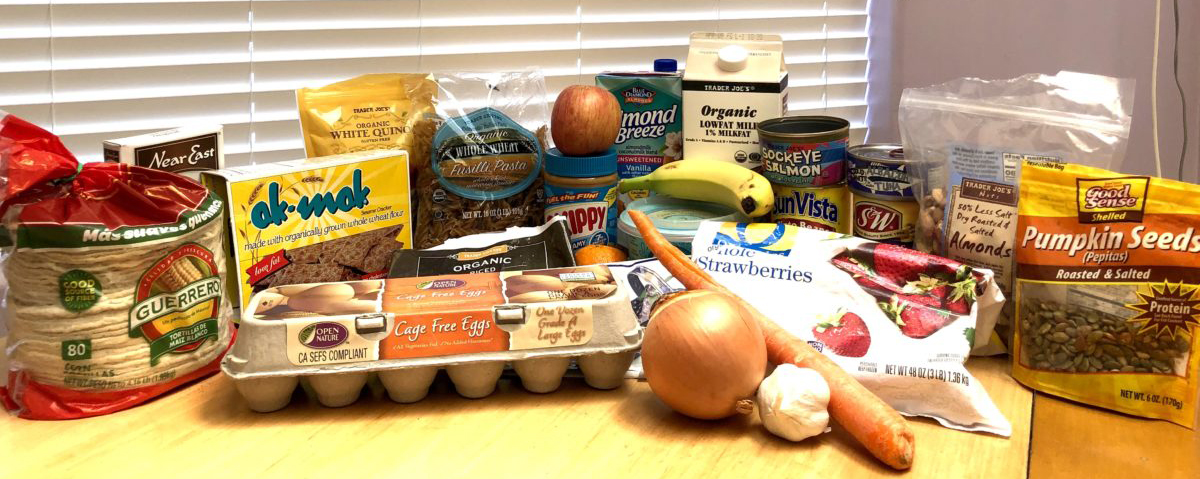by Dianne Staso, MS, R.D., Registered Dietitian
COVID-19 has really changed the way we live and grocery shop. What remains the same however is our desire to keep our families healthy. Along with hand washing, getting enough sleep, controlling stress and incorporating exercise into our routines, we need a healthy diet to keep our immune system strong. This includes eating a variety of foods, such as fruits, vegetables, beans, nuts, whole grains, healthy fats and protein. Here are some tips to ensure our families get the nutrients they need.
Pre-planning
As we spend more time at home, it’s important to maintain a routine with a balanced breakfast, lunch, dinner, and snacks. This routine prevents us from going too long between meals, while helping prevent us from unhealthy snacking all day. A balanced diet includes a variety of foods which include protein, vegetables, grains, legumes, fruits, dairy or non-dairy alternatives and healthy fats. A balanced meal contains 3-4 of these food groups: ideally half your plate fruits and vegetables, ¼ plate grains, ¼ plate protein, and a touch of healthy fat.
Have your family help you plan meals and write a grocery list together. Pre-planning meals for the week will decrease your trips to the grocery store and limit impulse buying. Have the kids search cookbooks or websites for recipes they can try on their own or make with a parent. Fun plans include a “picnic lunch in the yard” or an international dinner night of the week (Italian, Mexican, etc.).
Balanced breakfast ideas: overnight oats with fruit and nuts, fruit smoothies, avocado toast and egg
Balanced lunch ideas: Bean and cheese quesadillas with guacamole and salsa, hummus and veggie wraps, cold quinoa and pasta salads with chicken, beans and veggies dressed with a vinaigrette
Balanced dinner ideas: spaghetti and meatballs with a salad, chicken and broccoli stir fry with rice, baked salmon with roasted asparagus and sweet potatoes, ground turkey chili with cornbread and salad
Healthy snack ideas: various fruits, apples and nut butter, nuts and raisins, fresh or frozen strawberries with Greek yogurt, sliced vegetables (peppers, celery, snow peas, carrots) and hummus
Eight Food Staples to Have on Hand
Can’t get everything on your grocery list? Make sure you have some basic staples to create a balanced meal and healthy snacks.
Frozen Fruits and Vegetables – are picked at peak freshness and then flash frozen to retain all their valuable nutrients. Frozen strawberries and blueberries are filled with Vitamin C and antioxidants, which boost our immune system. They can be used in smoothies, mixed in yogurt or overnight oats. Frozen broccoli and spinach can be mixed in pasta, rice, soups or cooked and served as a side dish.
Nuts, Seeds and Nut Butters – are good sources of protein and full of healthy fats, antioxidants, vitamins and minerals. Have nuts and seeds for snacks, put them on yogurt and oatmeal. Nut butters are great on toast, apples, bananas, in oatmeal or thrown in smoothies.
Beans – are a great source of B vitamins, potassium and protein. Put them on top of baked potatoes topped with cheese or use in salads, soups, quesadillas or combined with a grain.
Canned Salmon, Chicken and Tuna – are inexpensive protein sources with a long shelf life. Make salmon cakes or use canned chicken and tuna for lunch salads.
Eggs – are a great source of inexpensive protein and essential vitamins and minerals. Eggs are great mixed with veggies.
Low- Fat Milk, Fortified Non-Dairy Milk Alternatives and Yogurt – good sources of calcium and Vitamin D. Yogurt is a good source of probiotics to maintain a healthy gut.
Grains – whole grains are an excellent source of B vitamins and fiber. Have oatmeal, brown rice, couscous, pastas, whole wheat crackers, corn and flour tortillas for quick meals and snacks.
Onions and Garlic – are potent antioxidants and have antibacterial properties. They have a long shelf life and add flavor to our dishes.
Dianne’s services include cooking demonstrations, lectures, and nutrition counseling for issues including weight loss, diabetes, cardiovascular disease, cancer and digestion issues.
To contact Dianne, you can email or call at (310) 374-3426, ext. 116.
You can read the full Easy Reader article here.




